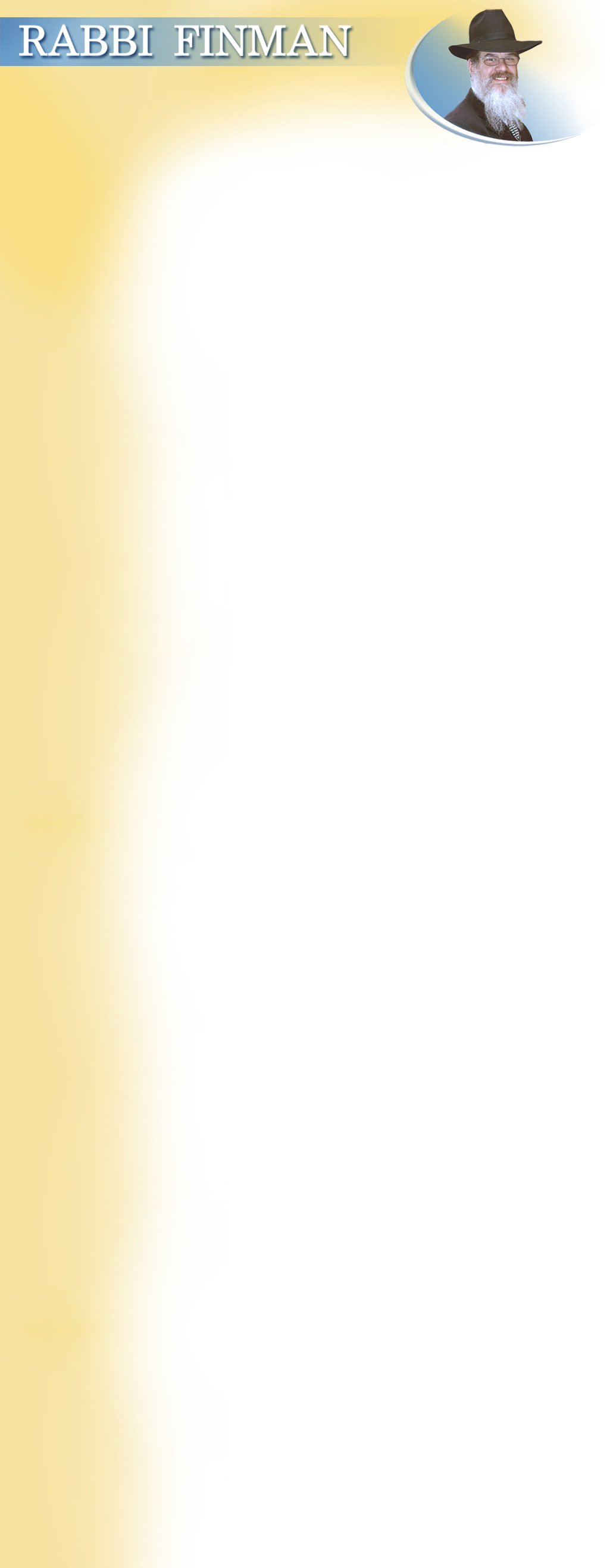








Back in 1996, Rabbi Finman was asked to speak to the niece of one of his students. After spending many hours answering her questions, the woman gave Rabbi Finman her e-mail address. Rabbi Finman wrote the woman a note and included in it a short insight into that week's Parsha and a short Chasidic story.
Realizing that this was something no one was yet doing,, Rabbi Finman sent the missive to his mailing list of about 30 people. Requests from recipients friends came pouring in. The next week Rabbi Finman sent the e-Parsha to 100 people. Within a year more than 2000 people were receiving it. Today, more than 14,000 receive the e-Parsha weekly and the requests keep coming in.
Titsaveh 5786
Terumah 5786
Mishpatim 5786
Yisro 5786
Beshalach 5786
Yisro 5786
Please click on the link below to receive the e-Parsha in the way cool HTML version right to your inbox. http://visitor.constantcontact.com/d.jsp?m=1103523647591&p=oi
= This week's YouParsha - http://www.youtube.com/watch?v=P22JFg5JhiI
The Stone Altar
===========================
This week's Parsha of Yisro, Exodus 18 - 20, features the giving of the Torah to the Jewish people on Sinai. The Revelation on Mount Sinai was the purpose for which the world was created. G'd descended on Mount Sinai and said, "I am (anochi) G-d your L-rd," in front of every Jewish man, woman and child, to be born throughout the millennia, The Midrash points out a curious fact: The word "anochi" is not Hebrew--it is Egyptian.
The Ten Commandments are a condensation of all the guiding principles of the Torah. Of these, the first two commandments, "I am G'd your Lord " and "You shall have no other gods," have an even greater measure of holiness, for they were heard by the Jews directly from Hashem and not through Moses. Why, then, did G'd choose to express the
loftiest of concepts, the "I," the very essence of Hashem, in a foreign tongue? Why not the Hebrew"Ani"?
In order to understand this paradox, we must first examine the purpose of the Revelation on Mount Sinai. The Torah was not given to guard the holiness contained in the Hebrew tongue; for this, no G'dly revelation would have been necessary. The Almighty descended on Mount Sinai for one reason - to enable us to elevate even the lowest and most mundane aspects of our lives and of the physical world, including the Egyptian language, the spoken words of the most corrupt and abominable nation.
Holiness existed before the Revelation, and Jews had long occupied themselves with the Torah. The innovation of the Revelation was the ability to "fuse" holiness with mundane, to imbue physical matter with spirituality. Even things that were seemingly far removed from the realm of holiness could now be used to bring G'dliness into the world.
A Jew's daily life involves elevating the physical and transforming it into a vessel for G'dliness. Prayer and Torah study enable us to reach only a limited level of spirituality. Elevating that which is base and seemingly trivial, by adhering to the laws of the Torah, enables us to attain even greater heights of holiness. When we fulfill G'd's will by elevating even the "anochi," as G-d Himself did, we fulfill the purpose of the Torah and carry out the world's Divine plan.
=====================
Question: I am a college student, and I come from a small community, so I never had a Jewish education. I find Reform Judaism too simplified and liberal, but I cannot follow the Orthodox services. What should I do?
The Rebbe: The stories in the Bible and Talmud apply to every generation. When the Talmud relates that Rabbi Akiva was forty years old and supporting a family when he started with “Alef-Bais,” and yet became one of the greatest rabbis of all time, it is to teach us that even with no previous Jewish education, one with a determined will can achieve even more than those who started before him. The mishna in Avos states: “Lo alecha hamalacha ligmor,” you are not expected to learn everything at once. A little bit each day, as long as you stay on the right track. Begin with the English translations of the Chumash, Kitzer Shulchan Aruch (Jewish laws), and Ain Yaakov (legends of the Talmud). Avoid the complacency of thinking you have attained the summit of your spiritual endeavors, but be constantly aware that there is more to strive for tomorrow, and G’d will give you strength. My major objection to Reform and Conservative Judaism is that they compromise their ideals; they make it easy for one to attain the pinnacle of Judaism, precluding further self-improvement. Orthodox Judaism requires continued spiritual progress, a little bit each day of one’s life.
=========================
Listen Weekly to the Jewish Hour Podcast. www.rabbifinman.com. Now available on iTunes, spotify, audacy, and wherever you park your podcasts.
The Torah e-Parsha is a project of Jewish Ferndale. For information on sponsoring the Torah e-Parsha in memory or for the recovery of a loved one, in honor of a simcha or you just feel like being nice, contact via reply. All contributions are tax deductible. Please forward this message to as many friends and associates as you like. © 2026 by Herschel Finman.
Contact Rabbi Finman for information on sponsoring the e-Parsha
